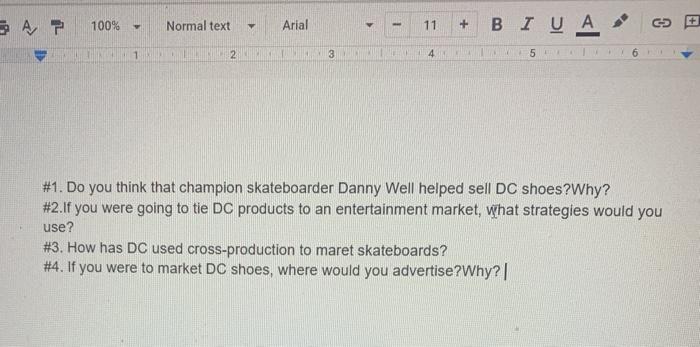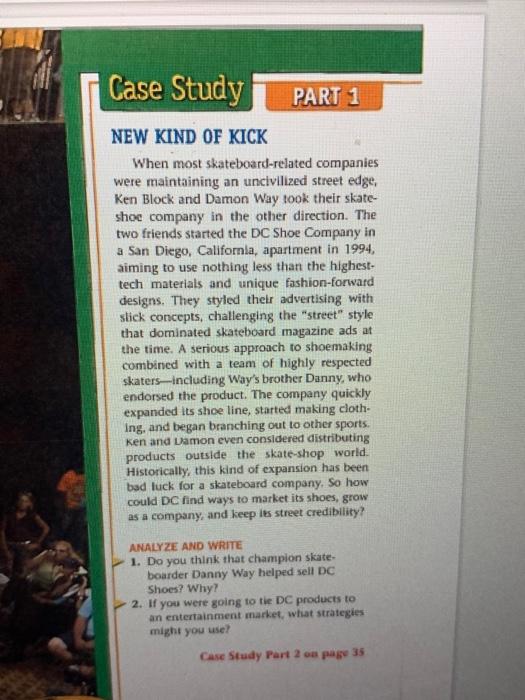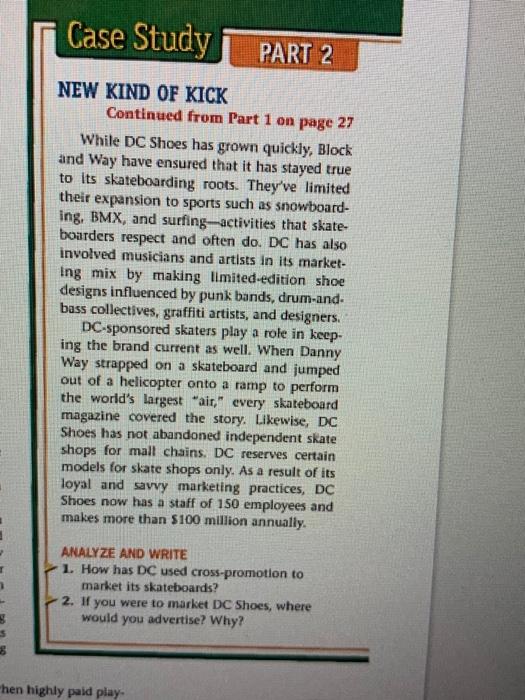this is a marketing question

100% - Normal text Arial 11 + B I U A 1 2 3 14 51 6 #1. Do you think that champion skateboarder Danny Well helped sell DC shoes?Why? #2. If you were going to tie DC products to an entertainment market, what strategies would you use? #3. How has DC used cross-production to maret skateboards? #4. If you were to market DC shoes, where would you advertise?Why?| Case Study PART 1 NEW KIND OF KICK When most skateboard-related companies were maintaining an uncivilized street edge, Ken Block and Damon Way took their skate- shoe company in the other direction. The two friends started the DC Shoe Company in a San Diego, California, apartment in 1994, aiming to use nothing less than the highest tech materials and unique fashion-forward designs. They styled their advertising with slick concepts, challenging the "street" style that dominated skateboard magazine ads at the time. A serious approach to shoemaking combined with a team of highly respected skaters including Way's brother Danny, who endorsed the product. The company quickly expanded its shoe line, started making cloth- Ing, and began branching out to other sports Ken and Damon even considered distributing products outside the skate-shop world. Historically, this kind of expansion has been bad luck for a skateboard company. So how could DC find ways to market its shoes, grow as a company, and keep its street credibility? ANALYZE AND WRITE 1. Do you think that champion skate- boarder Danny Way helped sell DC Shoes? Why? 2. If you were going to the DC products to an entertainment market, what strategies might you use? Case Study Part 2 on page 35 Case Study PART 2 NEW KIND OF KICK Continued from Part 1 on page 27 While DC Shoes has grown quickly, Block and Way have ensured that it has stayed true to its skateboarding roots. They've limited their expansion to sports such as snowboard- ing, BMX, and surfing activities that skate- boarders respect and often do. DC has also involved musicians and artists in its market- Ing mix by making limited-edition shoe designs influenced by punk bands, drum-and- bass collectives, graffiti artists, and designers. DC-sponsored skaters play a role in keep- ing the brand current as well. When Danny Way strapped on a skateboard and jumped out of a helicopter onto a ramp to perform the world's largest air," every skateboard magazine covered the story. Likewise, DC Shoes has not abandoned independent skate shops for mall chains. DC reserves certain models for skate shops only. As a result of its loyal and savvy marketing practices, DC Shoes now has a staff of 150 employees and makes more than $100 million annually. ANALYZE AND WRITE 1. How has DC used cross-promotion to market its skateboards? 2. If you were to market DC Shoes, where would you advertise? Why? hen highly paid play- 100% - Normal text Arial 11 + B I U A 1 2 3 14 51 6 #1. Do you think that champion skateboarder Danny Well helped sell DC shoes?Why? #2. If you were going to tie DC products to an entertainment market, what strategies would you use? #3. How has DC used cross-production to maret skateboards? #4. If you were to market DC shoes, where would you advertise?Why?| Case Study PART 1 NEW KIND OF KICK When most skateboard-related companies were maintaining an uncivilized street edge, Ken Block and Damon Way took their skate- shoe company in the other direction. The two friends started the DC Shoe Company in a San Diego, California, apartment in 1994, aiming to use nothing less than the highest tech materials and unique fashion-forward designs. They styled their advertising with slick concepts, challenging the "street" style that dominated skateboard magazine ads at the time. A serious approach to shoemaking combined with a team of highly respected skaters including Way's brother Danny, who endorsed the product. The company quickly expanded its shoe line, started making cloth- Ing, and began branching out to other sports Ken and Damon even considered distributing products outside the skate-shop world. Historically, this kind of expansion has been bad luck for a skateboard company. So how could DC find ways to market its shoes, grow as a company, and keep its street credibility? ANALYZE AND WRITE 1. Do you think that champion skate- boarder Danny Way helped sell DC Shoes? Why? 2. If you were going to the DC products to an entertainment market, what strategies might you use? Case Study Part 2 on page 35 Case Study PART 2 NEW KIND OF KICK Continued from Part 1 on page 27 While DC Shoes has grown quickly, Block and Way have ensured that it has stayed true to its skateboarding roots. They've limited their expansion to sports such as snowboard- ing, BMX, and surfing activities that skate- boarders respect and often do. DC has also involved musicians and artists in its market- Ing mix by making limited-edition shoe designs influenced by punk bands, drum-and- bass collectives, graffiti artists, and designers. DC-sponsored skaters play a role in keep- ing the brand current as well. When Danny Way strapped on a skateboard and jumped out of a helicopter onto a ramp to perform the world's largest air," every skateboard magazine covered the story. Likewise, DC Shoes has not abandoned independent skate shops for mall chains. DC reserves certain models for skate shops only. As a result of its loyal and savvy marketing practices, DC Shoes now has a staff of 150 employees and makes more than $100 million annually. ANALYZE AND WRITE 1. How has DC used cross-promotion to market its skateboards? 2. If you were to market DC Shoes, where would you advertise? Why? hen highly paid play










